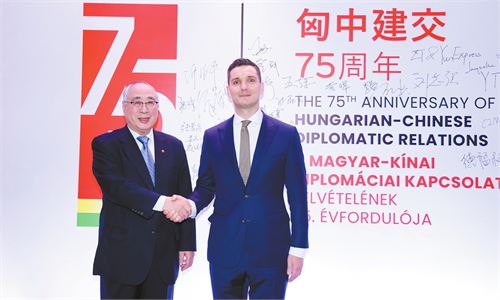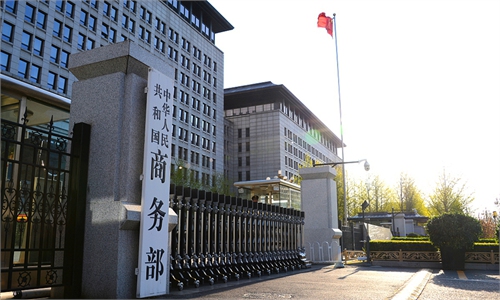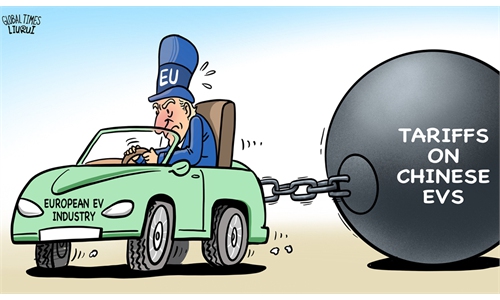OPINION / GLOBAL MINDS
'It's a mistake' for EU to increase tariffs on Chinese EVs: Hungarian official
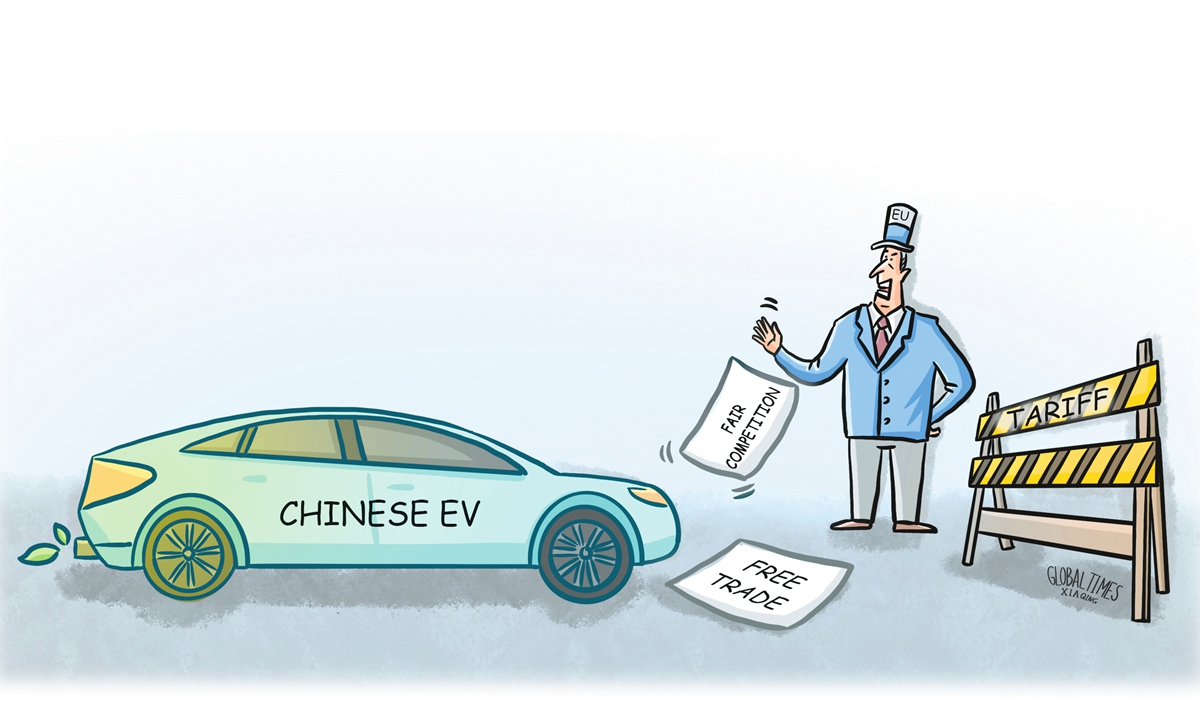
Illustration: Xia Qing/GT
Editor's Note:
The EU has recently decided to increase tariffs on Chinese-built electric vehicles (EVs) to as much as 45.3 percent, which has triggered divisions among member states, as well as between decision-makers and many European automakers. Hungary, as an EU member state and a partner of China in fields such as EVs, has voiced strong opposition to this EU move. The Global Times (GT) interviewed Márton Ugrósdy (Ugrósdy), Deputy State Secretary in charge of the Office of Political Director of the Prime Minister, who visited Beijing this week, to share his views on EU tariffs and Hungary's position.
GT: What do you think of the decision of the EU to increase tariffs on China's EVs?
Ugrósdy: It's a mistake for at least two reasons. First of all, this doesn't make Europe competitive. What we see is that Europe is lagging behind when it comes to EV technology, and cooperation with countries and companies who are in a more advanced position would only benefit us in the long run. Thus, cooperation with Chinese companies in the European markets will be something which could be beneficial for Europe. Instead of protecting the market which is a little bit outdated, we should open up a little bit more and learn from our competitors. This is how business works.
It also endangers the EU's green transition, because we do not have enough capacity to produce EVs, or the batteries that are being produced by Chinese, South Korean or other companies.
I think the third message is even more striking, as we see that China-EU relations are becoming increasingly politicized every day. Whether this is good for Europe is doubtful, because Europe traditionally used to be an open economy - the more trading partners we had, the better our economy was, historically. China has been instrumental in the economic growth of Europe in the last decade or so. Therefore, any measure that threatens this kind of relationship is not something that would be welcomed by European companies.
It was equally interesting that when the German auto companies were asked if they support tariffs against the Chinese, they said no because they said they need competition. So, if those companies, which are to be protected allegedly by this regulation, are against the regulation itself, I think people should ask whether this is something that is in the interest of the EU in the long run.
GT: Prime Minister Viktor Orban warned that it would be an "economic cold war." What is your take?
Ugrósdy: I think he is right, because this is the direction we're going in. But it's still up to the political decision-makers in Europe - the new European Commission and the heads of state and government in all of the European countries - to decide whether they really want to go down that road.
If you look at the long-term trajectory, I think Europe should ask itself some serious questions, such as whether aligning its foreign policy with the US in the long run is beneficial for Europe. I think Europe should make its own decisions, and this is what our prime minister is advocating as well. Europe should be looking at its own economic interests. I don't think a trade war is in the interest of the EU, despite this being a very likely scenario at the moment. It will be up to the leaders of the European countries, especially the main member states, but also the smaller member states, to come up with an agreement on how we can have a long, lasting and sustainable economic relationship with China.
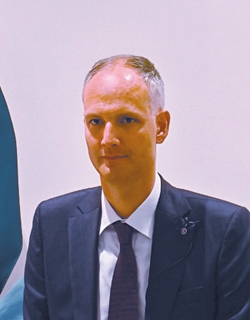
Ugrósdy: I think Hungary must remain the voice of reason in the debates on China within the European Union, because what we see is that, especially on the side of the European institutions, there is a very strict political agenda against China because of certain reasons beyond the reach and beyond the scope of the European institutions. But still, you see a few member states who are more inclined to talk to China, to engage China, to work with China.
If Hungary can remain the voice of reason in the discussion underlying the importance of the economic relationship, underlying the importance of China to Europe in the long run as a market for European products, and also point out the role China is playing in the global order, that's a good start. Then we can see what we can build on top of the very sound economic relationship and further encourage Chinese companies to come to invest in Hungary and in the EU single market. So, there are quite a lot of opportunities in front of us.
GT: How can Hungary resist pressure from opposition voices within the EU?
Ugrósdy: Something that our prime minister realized back in the day is that the Hungarian government is elected by the Hungarian people and nobody else. Therefore, he will always have the interests of the Hungarian people as his No.1 priority.
Right now, the interest of the Hungarian people is to have a functioning and competitive economy. If China helps us to achieve this goal, all the better. If Russia can help us to achieve that goal through cheap energy, we will be looking at it. If the Americans are willing to bring investment in Hungary, we will be happy to work with the Americans. If the Germans want to have more investment in Hungary, we will consider that based on the competitive advantage of the country. This is what we call the strategy of connectivity.
More recently, this is what the prime minister means when he talks about economic neutrality. We're open to working with everybody from all around the world. There are certain criteria related to national security and national interest and so on and so forth. But if those concerns are addressed, we are literally happy to work with anybody from Argentina to Japan. It doesn't matter where the technology comes from, as long as it contributes to the Hungarian economy and the development of the Hungarian people.
China fits into that picture very well, not only because of the very good bilateral relationship our countries have built in the last 20 years, but also because the role of China and the world is changing. The sooner we understand that, the sooner we can fit that into the picture of the world that we would like to see. The more we can defuse the misunderstandings, the more we can understand each other; the more people-to-people contact we have and the more high-level engagements we have, the easier it will get. Whether some other European politicians will criticize us for this, that's none of our concern.
GT: This year marks the 75th anniversary of the establishment of China-Hungary ties. What do you think is the foundation of stability in China-Hungary relations?
Ugrósdy: The answer is very simple. It's mutual respect. That's crucial because we don't have that even with many of our allies. If we consider the international system as one of equal partners, if being a very big partner makes you feel equal, that's a good start, but that wouldn't be enough.
I think the joint objectives of both governments putting the people first, putting economic development first and focusing less on political differences are something not very common in the world today, because everybody tends to, at least from the West, criticize other countries for their different policies. We don't do that, because we respect the right of all nations around the world to select and elect and choose their own government.
Moreover, both of us put our national interests first. When these national interests align, we are very keen to work together. We respect our differences as well, and we're not trying to force the other party to take our position just for the sake of doing so, which ultimately reflects our mutual respect.
